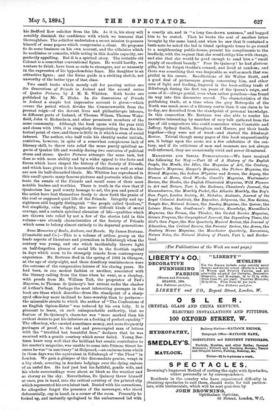Some Memories of Books, Authors, and Events. By James Bertram.
(Constable and Co.)—This is a volume of artless gossip on the trade aspects of literature and journalism in Edinburgh when the century was young, and one which incidentally throws light on half-forgotten phases of social life in the Scottish capital in days which seem to lie strangely remote from contemporary experience. Mr. Bertram died in the spring of 1892 in Glasgow, at the age of sixty-eight, and these desultory reminiscences were the outcome of the comparative leisure of his closing years. He had been, in one modest fashion or another, associated with the literary calling from the time when he went, as a shopboy, with proofs from Mr. William Tait, the proprietor of Tait' s Magazine, to Thomas de Quincey's last retreat under the shadow of Arthur's Seat. Perhaps the most interesting passages in the book are those which describe—from the standpoint of a sharp- eyed office-boy more inclined to hero-worship than to pertness— the miserable straits to which the author of "The Confessions of an English Opium-Eater" was reduced by his own folly. It is pleasant to learn, on such unimpeachable authority, that no feature of De Quincey's character was "more marked than his evident desire to put his inferiors on a footing of perfect equality." The office-boy, who carried sometimes money, and more frequently packages of proof, to the sad and preoccupied man of letters with the "troubled but beautiful face," declares that he was received with a gentle courtesy which never failed. Young Ber- tram knew very well that the brilliant but erratic contributor to his master's magazine, was unable to come into Princes Street be- cause he was " in sanctuary" at Holyrood,—an ominous term which in those days was the equivalent in Edinburgh of " the Fleet" in London. We gain a glimpse of the disconsolate genius, wrapt in a big cloak, cowering in desolate lodgings over the dying embers of an unfed fire. He had just lost his faithful, gentle wife, and his whole surroundings were about as bleak as the weather and as stormy as the sky. Nevertheless, De Quincey threw himself at once, pen in hand, into the critical scrutiny of the printed slip which represented hisown latest task. Busied with his corrections, he altogether forgot the presence of the messenger, who stood deferentially, cap in hand, in a corner of the room. Presently he looked up, and instantly apologised to the embarrassed lad with a courtly air, and ill " a long fine-drawn sentence," and begged him to be seated. Then he broke the seal of another letter brought by the same hand, and when he saw that it contained a bank-note he asked the lad in bland apologetic tones to go round to a neighbouring public-house, present his compliments to the landlady, with the request that she would oblige him with change, and also that she would be good enough to send him a "small supply of excellent brandy." Poor De Qtrincey ! he had glorious gifts, but he forgot Goethe's counsel, and lived at random; and there was something that was despicable as well as much that was pitiful in his career. Recollections of Sir Walter Scott, and a good deal of picturesque gossip concerning him, and other men of light and leading, lingered in the book-selling trade of Edinburgh during the first ten years of the Queen's reign, and some of it—always genial, even when rather pointless—has found its way into this discursive record. The characteristics of the publishing trade, at a time when the grey Metropolis of the North was much more of a literary centre than it can claim to be to-day, are described from the standpoint of personal knowledge. In this connection Mr. Bertram was also able to render his narrative interesting by snatches of racy talk gathered from the lips of old compositors who could remember when Constable and Jeffrey, Sydney Smith, Brougham and Horner, put their heads together—they were not of wood—and started the Edinburgh Review. Trivial though many pages of this book unquestionably are, it brings upon the scene not a few celebrities of the cen- tury, and if its criticisms of men and manners are not always well-informed, they are occasionally vivid and never ill-natured.






































 Previous page
Previous page